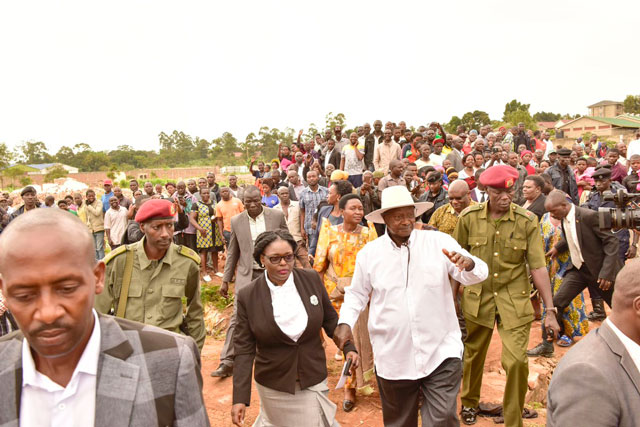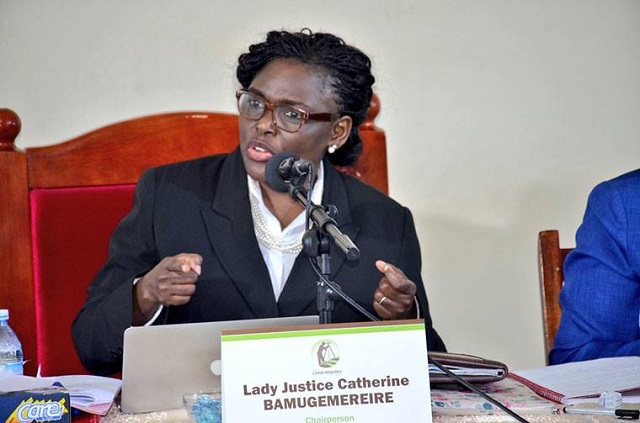
If this commission was not intended to mollify the bad situation, it is a landmark report that should be implemented by any progressive and revolutionary government.
COMMENT | Gyagenda Semakula Zikusooka | On September 2, 2020 just 35 days after Justice Catherine Bamugemereire handed over her 750-page report to President Museveni, the Daily Monitor published a story “Constitutional Court quashes Bamugemereire land probe.” The story that was written by Ephraim Kasozi and Jalira Namyalo who were present and regular at the commission’s public hearings for the greater part of its inception, seemed alarmist.
To a gullible citizenry that misrepresents every fact, the story went viral without due attention to the facts therein. In a 4:1 majority decision, court quashed the orders of the Commission’s chairperson that led to the arrest and detention of city businessman Abid Alam who was probed for acquiring 10,000 acres of land in Mubende District.
Alam’s case was questioning the powers of the commission to order his arrest that it had done on November 8, 2017 on allegation that he was obstructing its work. The commission had conducted public hearings during a field visit to Mityana Farm Group enterprises which is owned by Alam between September 11 & 14, 2017.
Whether Alam’s case was of a Constitutional nature, this is for another day. However, THE REPORT WAS NOT QUASHED. The headline was intended to hoodwink the public that there is nothing left to this inquiry. It’s not true.
The voluminous 750-page report recommended among other issues, a national land bank to operate under the Uganda Lands Services Bureau, enactment of a distinct wetland law, establishment of a land and environment court, reinstatement of district land tribunals and establishment of a land ombudsman. If this commission was not intended to mollify the bad situation, it is a landmark report that should be implemented by any progressive and revolutionary government.
The long history of probes
But what is it with Uganda’s Commissions of Inquiries? Do we constitute them to mollify bad situations or to solve problems?
The most recent is the seven-member land commission that Gen. Museveni appointed on December 8, 2016, barely seven months into his current term of office, to investigate into land matters, pretty aware that he has led an administration that until now has no clear land policy on acquisition, registration, management, and the obscene rampant life threatening evictions. He appointed Court of Appeal Justice Catherine Bamugemereire to lead this inquiry. This is currently her third commission in just three and half years.

Having traversed the country asking for votes, Mr. Museveni discovered that the rampant land evictions were a threat to his baseline support and grip on power. He constituted a judicial inquiry in December 2016. This could not be sworn in till late February 2017 and waited up to May 2017 to officially start public hearings. The six months probe was extended to May 2018 before getting another 18 months extension.
Just like the UNRA probe, the land inquiry grilled several big wigs in government, private and the corporate sectors in addition to ordering arrests of some people, most notably Abid Alam who was investigated for alleged illegal eviction of thousands of people from their own land. The tough-talking and spirited Bamugemereire became a darling and a household name amongst the oppressed Ugandans who had become vagrants and vagabonds in their own country. It was indeed a soothing season.
Surprisingly, all her efforts were watered down by her own staff at the commission’s secretariat. She headed a noble cause that was blotted with abettors of corruption and conspirators to land grabbers. They traded case files and leaked information to accused persons. Some of her secretariat staff labored to fail the report. The commission that had a national outlook in executing its mandate received over 8500 complaints from the 123 districts constituting 91% of the total districts. They fell short of only 12 districts of the entire 135.
The Commission that exhaustively tackled issues of the Land Fund and the Uganda Land Commission also recommended the establishment of an institutional framework for administration of customary land within Uganda Land Services Bureau.
The President joyously received this report on July 29, 2020 and said it will be given to the line minister who will present it to cabinet for discussion and government will write a white paper to address it in totality. Before this could take shape, the 2017 Alam case was resurrected and concluded. The quashing headline then showed up to tell the Commission, we are not interested in your findings.
Again, are inquiries just a tradition of defusing public rage or intended to solve a problem?
Legal notice No.5 of 1986
The history of Uganda’s commissions of inquiries in the recent past dates back to Legal Notice No. 5 of 1986. This was a commission of inquiry into the violations of human rights that was appointed on May 16, 1986 – three months after NRA’s Commander Museveni had taken office.
The Justice Arthur Oder’s 720-pages commission report that gathered evidence and testimony relating to the events of October 9, 1962 to January 25, 1986 was tabled eight years later, on October 10, 1994. The commission’s recommendations and findings were so revealing and I am pretty sure that Gen. Museveni who was focused and fixated on rebuilding the shattered nation wouldn’t think about implementing the report any time soon. Yes, we all needed to heal and to cure our country’s scars.
This good feat at that time gave birth to a tradition of considering commissions of inquiries’ reports as intended to simply defuse public rage. [ Continued on page 2]
 The Independent Uganda: You get the Truth we Pay the Price
The Independent Uganda: You get the Truth we Pay the Price



